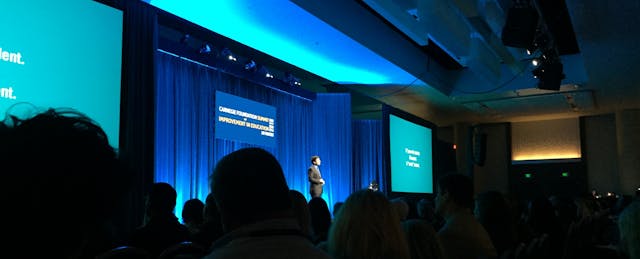Most of what we experience in our daily lives is easily forgotten. Even great and impressionable moments can turn out to be fleeting and eventually fade from memory.
But occasionally, moments and the lessons they come with can stick for a lifetime. Author Dan Heath says creating more moments like these in the classroom can help students learn. And he believes that both K-12 and higher-ed instructors can make that happen.
Heath, who has co-written books including “Made to Stick” and “The Power of Moments,”delivered a keynote Thursday at the 2018 Carnegie Foundation Summit on Improvement in Education in San Francisco. Fitting with the conference’s theme this year around improvement science, Heath’s talk started off with a lesson in psychology, in particular around what and why people remember.
According to Heath, psychologists have found that people are more likely to recall memories happening near major transitions in their lives, such as the beginning of a new school year rather than from the middle of an academic term.
“Within any given span of experience, then, some moments will always be vastly more meaningful and memorable than others,” Heath wrote in an article with his brother, Chip, in FastCompany. And that’s important for educators in particular, he urges, because “if we understand what powerful moments are made of, we can be intentional about creating them.”
Heath and Chip have identified a pattern to what makes moments memorable. Some of that might not come as a surprise: it’s the moments that cause deep reflection or insight, and elevating or victorious feeling, and moments of great pride or social connection.
Heath also argued that many of these kinds of memorable moments tend to occur outside the classroom. For students, it might take place at prom or a big basketball game. To Heath, that’s a “tragedy.” But he isn’t hopeless. And during the keynote he challenged educators by asking: “How do we create more academic peak moments in school?”
These moments don’t just happen, and educators must plan and execute them, he posited. He gave an example of two teachers from Hillsdale High School in San Mateo, Calif. who have their students hold a mock trial on whether or not “Lord of the Flies” author William Golding libeled human nature. Heath said that every year at graduation, a student speaker mentions this activity.
The prom, on the other hand, is less frequently highlighted in the graduation speeches, Heath said. “[The teachers] have created an academic experience as memorable as prom.”
Heath also called upon college and university instructors to think about ways their lessons can leave a lasting memory on students. To do so, he claimed, faculty need to move away from the usual mindset of taking a textbook, identifying modules and organizing lectures designed around a cookie cutter curriculum. Heath referred to the style as choosing from a “vast buffet of content,” and by that doing so, an instructor may not think uniquely and intentionally about what he or she wants a student to take away from the course.
For professors who don’t like being told what to do, Heath’s recommendations might not sit well. The author recognized this, and in response he pointed listeners to someone who’s learned how to make the conversation perhaps more approachable: Michael Palmer, an associate professor of Chemistry at the University of Virginia, who helps educators design or redesign their classes at the Course Design Institute.
Palmer works to help faculty design deeply memorable moments in class through an activity called “the dream exercise.” He asks professors to imagine they have a group of dream students, and to fill in the following sentences:
- 3-5 years from now, my students will know_____.
- Or they still are able to do_____.
- Or they still find value in_____.
Palmer then asks the professors to point out which parts of their current syllabus will advance their students toward the dreams instructors have for them—and that was an eye-opening exercise for some professors who struggled to answer the question.
“It’s a blockbuster moment,” Heath said, ”And it’s a moment that provides the impetus for change.”


